Payam Abdisarabshali
From Federated Learning to $\mathbb{X}$-Learning: Breaking the Barriers of Decentrality Through Random Walks
Sep 03, 2025Abstract:We provide our perspective on $\mathbb{X}$-Learning ($\mathbb{X}$L), a novel distributed learning architecture that generalizes and extends the concept of decentralization. Our goal is to present a vision for $\mathbb{X}$L, introducing its unexplored design considerations and degrees of freedom. To this end, we shed light on the intuitive yet non-trivial connections between $\mathbb{X}$L, graph theory, and Markov chains. We also present a series of open research directions to stimulate further research.
Hierarchical Federated Foundation Models over Wireless Networks for Multi-Modal Multi-Task Intelligence: Integration of Edge Learning with D2D/P2P-Enabled Fog Learning Architectures
Sep 03, 2025


Abstract:The rise of foundation models (FMs) has reshaped the landscape of machine learning. As these models continued to grow, leveraging geo-distributed data from wireless devices has become increasingly critical, giving rise to federated foundation models (FFMs). More recently, FMs have evolved into multi-modal multi-task (M3T) FMs (e.g., GPT-4) capable of processing diverse modalities across multiple tasks, which motivates a new underexplored paradigm: M3T FFMs. In this paper, we unveil an unexplored variation of M3T FFMs by proposing hierarchical federated foundation models (HF-FMs), which in turn expose two overlooked heterogeneity dimensions to fog/edge networks that have a direct impact on these emerging models: (i) heterogeneity in collected modalities and (ii) heterogeneity in executed tasks across fog/edge nodes. HF-FMs strategically align the modular structure of M3T FMs, comprising modality encoders, prompts, mixture-of-experts (MoEs), adapters, and task heads, with the hierarchical nature of fog/edge infrastructures. Moreover, HF-FMs enable the optional usage of device-to-device (D2D) communications, enabling horizontal module relaying and localized cooperative training among nodes when feasible. Through delving into the architectural design of HF-FMs, we highlight their unique capabilities along with a series of tailored future research directions. Finally, to demonstrate their potential, we prototype HF-FMs in a wireless network setting and release the open-source code for the development of HF-FMs with the goal of fostering exploration in this untapped field (GitHub: https://github.com/payamsiabd/M3T-FFM).
Multi-Modal Multi-Task (M3T) Federated Foundation Models for Embodied AI: Potentials and Challenges for Edge Integration
May 16, 2025Abstract:As embodied AI systems become increasingly multi-modal, personalized, and interactive, they must learn effectively from diverse sensory inputs, adapt continually to user preferences, and operate safely under resource and privacy constraints. These challenges expose a pressing need for machine learning models capable of swift, context-aware adaptation while balancing model generalization and personalization. Here, two methods emerge as suitable candidates, each offering parts of these capabilities: Foundation Models (FMs) provide a pathway toward generalization across tasks and modalities, whereas Federated Learning (FL) offers the infrastructure for distributed, privacy-preserving model updates and user-level model personalization. However, when used in isolation, each of these approaches falls short of meeting the complex and diverse capability requirements of real-world embodied environments. In this vision paper, we introduce Federated Foundation Models (FFMs) for embodied AI, a new paradigm that unifies the strengths of multi-modal multi-task (M3T) FMs with the privacy-preserving distributed nature of FL, enabling intelligent systems at the wireless edge. We collect critical deployment dimensions of FFMs in embodied AI ecosystems under a unified framework, which we name "EMBODY": Embodiment heterogeneity, Modality richness and imbalance, Bandwidth and compute constraints, On-device continual learning, Distributed control and autonomy, and Yielding safety, privacy, and personalization. For each, we identify concrete challenges and envision actionable research directions. We also present an evaluation framework for deploying FFMs in embodied AI systems, along with the associated trade-offs.
Redefining non-IID Data in Federated Learning for Computer Vision Tasks: Migrating from Labels to Embeddings for Task-Specific Data Distributions
Mar 17, 2025

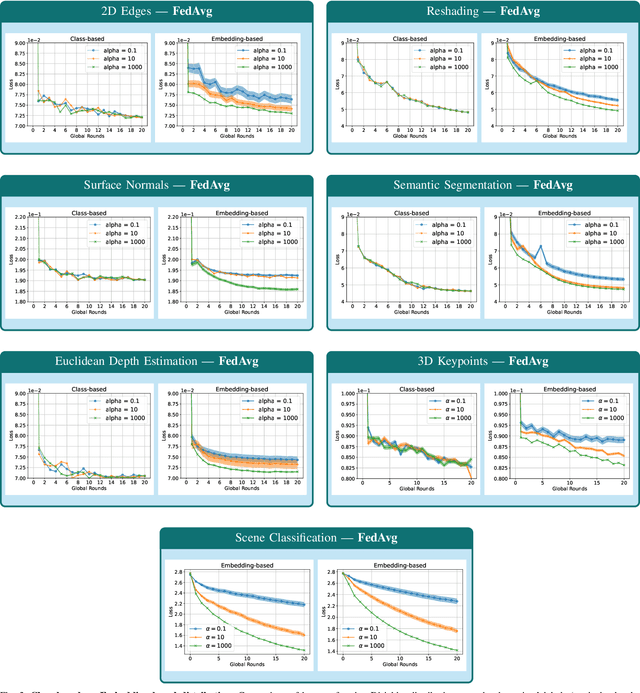

Abstract:Federated Learning (FL) represents a paradigm shift in distributed machine learning (ML), enabling clients to train models collaboratively while keeping their raw data private. This paradigm shift from traditional centralized ML introduces challenges due to the non-iid (non-independent and identically distributed) nature of data across clients, significantly impacting FL's performance. Existing literature, predominantly model data heterogeneity by imposing label distribution skew across clients. In this paper, we show that label distribution skew fails to fully capture the real-world data heterogeneity among clients in computer vision tasks beyond classification. Subsequently, we demonstrate that current approaches overestimate FL's performance by relying on label/class distribution skew, exposing an overlooked gap in the literature. By utilizing pre-trained deep neural networks to extract task-specific data embeddings, we define task-specific data heterogeneity through the lens of each vision task and introduce a new level of data heterogeneity called embedding-based data heterogeneity. Our methodology involves clustering data points based on embeddings and distributing them among clients using the Dirichlet distribution. Through extensive experiments, we evaluate the performance of different FL methods under our revamped notion of data heterogeneity, introducing new benchmark performance measures to the literature. We further unveil a series of open research directions that can be pursued.
Dynamic D2D-Assisted Federated Learning over O-RAN: Performance Analysis, MAC Scheduler, and Asymmetric User Selection
Apr 09, 2024



Abstract:Existing studies on federated learning (FL) are mostly focused on system orchestration for static snapshots of the network and making static control decisions (e.g., spectrum allocation). However, real-world wireless networks are susceptible to temporal variations of wireless channel capacity and users' datasets. In this paper, we incorporate multi-granular system dynamics (MSDs) into FL, including (M1) dynamic wireless channel capacity, captured by a set of discrete-time events, called $\mathscr{D}$-Events, and (M2) dynamic datasets of users. The latter is characterized by (M2-a) modeling the dynamics of user's dataset size via an ordinary differential equation and (M2-b) introducing dynamic model drift}, formulated via a partial differential inequality} drawing concrete analytical connections between the dynamics of users' datasets and FL accuracy. We then conduct FL orchestration under MSDs by introducing dynamic cooperative FL with dedicated MAC schedulers (DCLM), exploiting the unique features of open radio access network (O-RAN). DCLM proposes (i) a hierarchical device-to-device (D2D)-assisted model training, (ii) dynamic control decisions through dedicated O-RAN MAC schedulers, and (iii) asymmetric user selection. We provide extensive theoretical analysis to study the convergence of DCLM. We then optimize the degrees of freedom (e.g., user selection and spectrum allocation) in DCLM through a highly non-convex optimization problem. We develop a systematic approach to obtain the solution for this problem, opening the door to solving a broad variety of network-aware FL optimization problems. We show the efficiency of DCLM via numerical simulations and provide a series of future directions.
Synergies Between Federated Learning and O-RAN: Towards an Elastic Virtualized Architecture for Multiple Distributed Machine Learning Services
Apr 14, 2023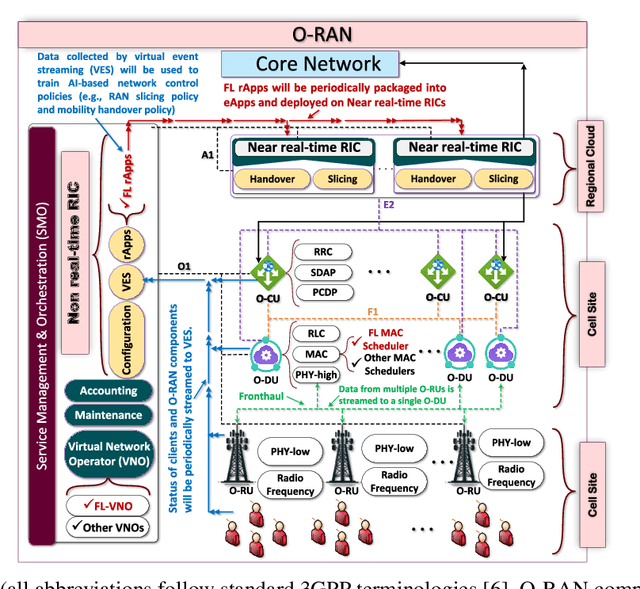
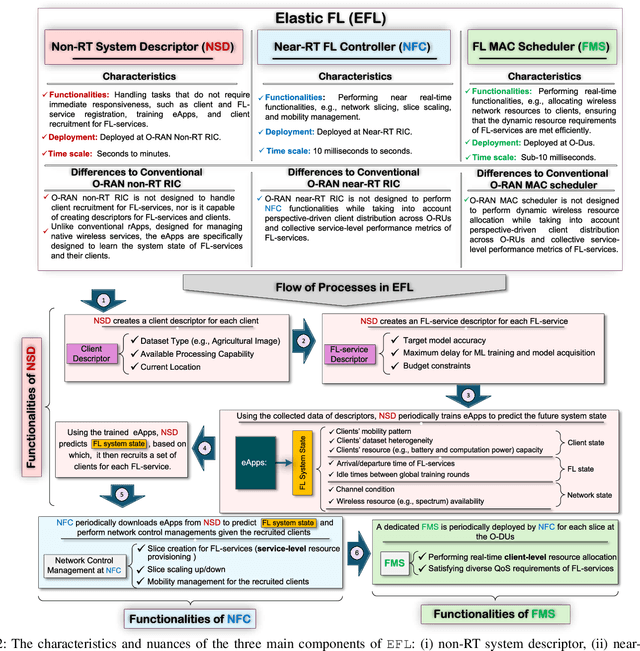
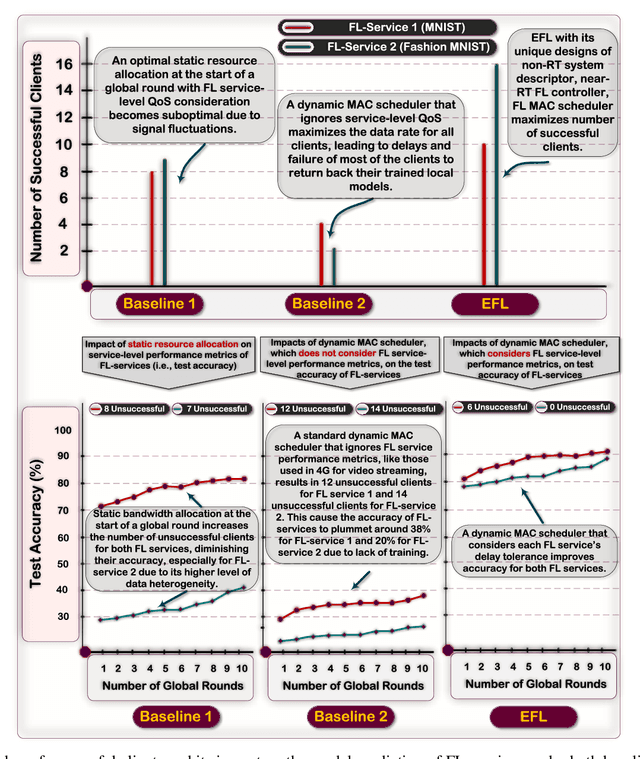
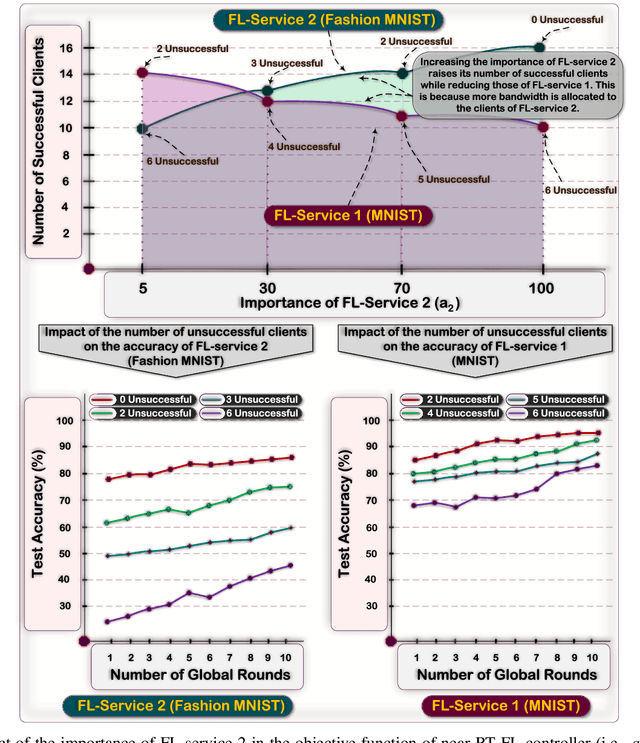
Abstract:Federated learning (FL) is the most popular distributed machine learning technique. However, implementation of FL over modern wireless networks faces key challenges caused by (i) dynamics of the network conditions, (ii) coexistence of multiple FL services/tasks in the system, and (iii) concurrent execution of FL services with other network services, which are not jointly considered in prior works. Motivated by these challenges, we introduce a generic FL paradigm over next-generation (NextG) networks, called dynamic multi-service FL (DMS-FL). We identify three unexplored design considerations in DMS-FL: (i) FL service operator accumulation, (ii) wireless resource fragmentation, and (iii) signal strength fluctuations. We take the first steps towards addressing these design considerations through proposing a novel distributed ML architecture called elastic virtualized FL (EV-FL). EV-FL unleashes the full potential of Open RAN (O-RAN) systems and introduces an elastic resource provisioning methodology to execute FL services. It further constitutes a multi-time-scale FL management system that introduces three dimensions into existing FL architectures: (i) virtualization, (ii) scalability, and (iii) elasticity. Through investigating EV-FL, we reveal a series of open research directions for future work. We finally simulate EV-FL to demonstrate its potential to save wireless resources and increase fairness among FL services.
 Add to Chrome
Add to Chrome Add to Firefox
Add to Firefox Add to Edge
Add to Edge